

On April 11, 2024, following the release of the notice on the revision of the undergraduate training program for the undergraduate class entering in 2024 by the Academic Affairs Office of the university, the School of Accounting attached great importance to the matter. It immediately proposed a list of members for the second Undergraduate Teaching Steering Committee and formulated a schedule for the revision of the undergraduate talent training program for the undergraduate class entering in 2024. The ultimate goal was to develop an outstanding accounting major talent training program that is more in line with social demands, has international competitiveness, and adapts to industry development. The focus was on cultivating students' learning abilities, communication and coordination skills, cross-cultural communication skills, practical abilities, and innovation capabilities.
To ensure the high-quality completion of the revision of the training program, the School of Accounting first organized the heads of various departments and teaching and research sections to study carefully the university's guiding opinions on the revision of the undergraduate talent training program (hereinafter referred to as the "Guiding Opinions"). On April 24, each department organized its faculty members to study the Guiding Opinions collectively and widely solicited suggestions from the teaching staff regarding the revision of the training program.
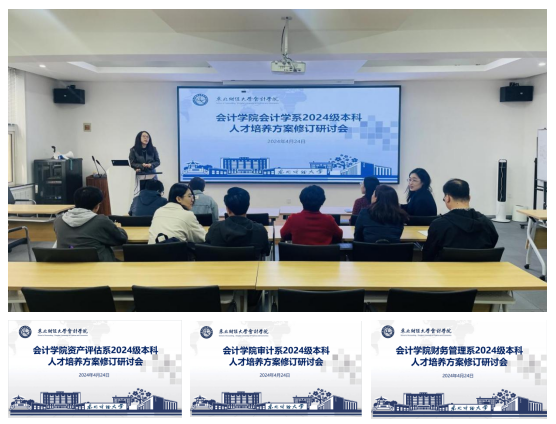
On May 16, the school organized a symposium on the revision of the undergraduate talent training program for the undergraduate class entering in 2024. Associate Dean of the School of Accounting, Kejing Chen, and heads of various departments and teaching and research sections attended the meeting. During the meeting, the guiding opinions were collectively reviewed, and the credit allocation for general education courses and elective courses was discussed. The course settings and faculty arrangements for the modules of integration of scientific research and education (Sci-Edu Integration) and integration of industry and education (Industry-Edu Integration) were preliminarily determined, and the schedule for subsequent work was agreed upon.
On May 20, the school organized a kick-off meeting for the revision of the undergraduate talent training program for the undergraduate class entering in 2024. The main leaders of the school, heads of various departments, and teacher representatives attended the meeting. During the meeting, the department heads respectively reported on the progress and plans for the revision of the training program, discussed the course settings and module divisions of elective courses, and listened to the suggestions from faculty representatives regarding the revision of the training program.
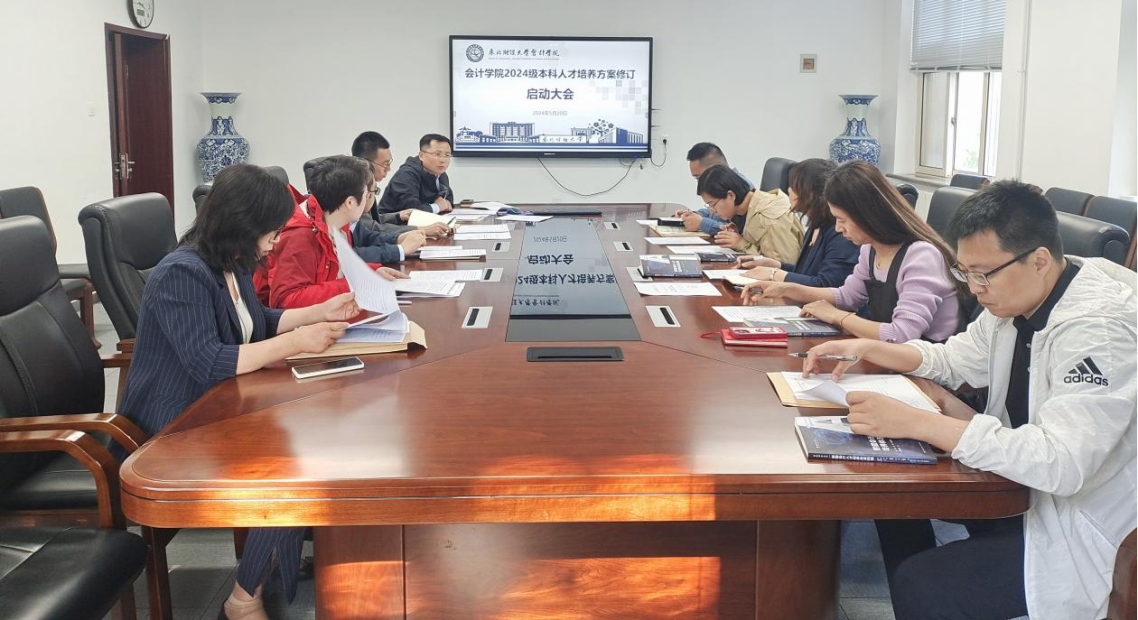
After the basic curriculum framework of the training program was determined, each department organized separate faculty-student symposiums for the revision of the training program. The student representatives, based on their own learning experiences, put forward many suggestions and opinions on the current course settings, semester planning, and learning difficulty of the training program, which provided important references for the revision of the new training program.
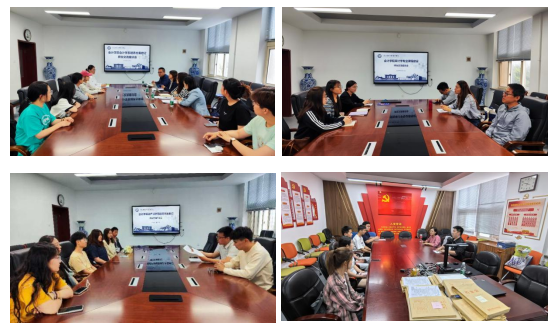
During the revision of the training program, the school held symposiums with several organizations, including the Dalian Branch of Ernst & Young Hua Ming (Special General Partnership) CPA Firm, the Shenzhen Branch of Lixin Certified Public Accountants (Special General Partnership), Xinhuaxin Technology Co., Ltd., Shanghai Pudong Development Bank Co., Ltd., Inspur Zhuyuan Technology Co., Ltd., iFLYTEK Co., Ltd., and the Association of International Certified Professional Accountants. The school also organized a series of seminars on the cultivation of digital and intelligent accounting talents to conduct research on the demand for accounting talents and talent certification. These seminars helped to further clarify the talent training objectives of the training program, scientifically design the curriculum system, and define the supporting relationship between courses and students' knowledge, skills, and quality development.
On June 3, to further advance the revision of the undergraduate talent training program for the undergraduate class entering in 2024, the university convened an experience-sharing meeting on the revision of the undergraduate talent training program for the undergraduate class entering in 2024 in Room 703 of Duxing Building. Faculty Fajing Cui from the Department of Accounting represented the school to report on the revision of the accounting major's training program and engaged in thorough discussions with the heads of relevant majors from other schools on aspects such as talent training objectives, innovative points of the training program, progress of research work, and comparative analysis of talent training with similar majors at peer universities.
After going through the above steps, each major formed a draft of the training program. On June 7, the school held an internal review symposium on the draft of the undergraduate talent training program for the undergraduate class entering in 2024. During the meeting, each department reported on the progress of the training program revision, and conducted in-depth discussions on issues existing in the revision of the training program, the course settings of the industry-education integration and science-education integration modules, faculty allocation and course scheduling for cross-departmental elective courses, as well as conducted interpretative analysis and comparative studies of the talent training programs of mainstream domestic universities.
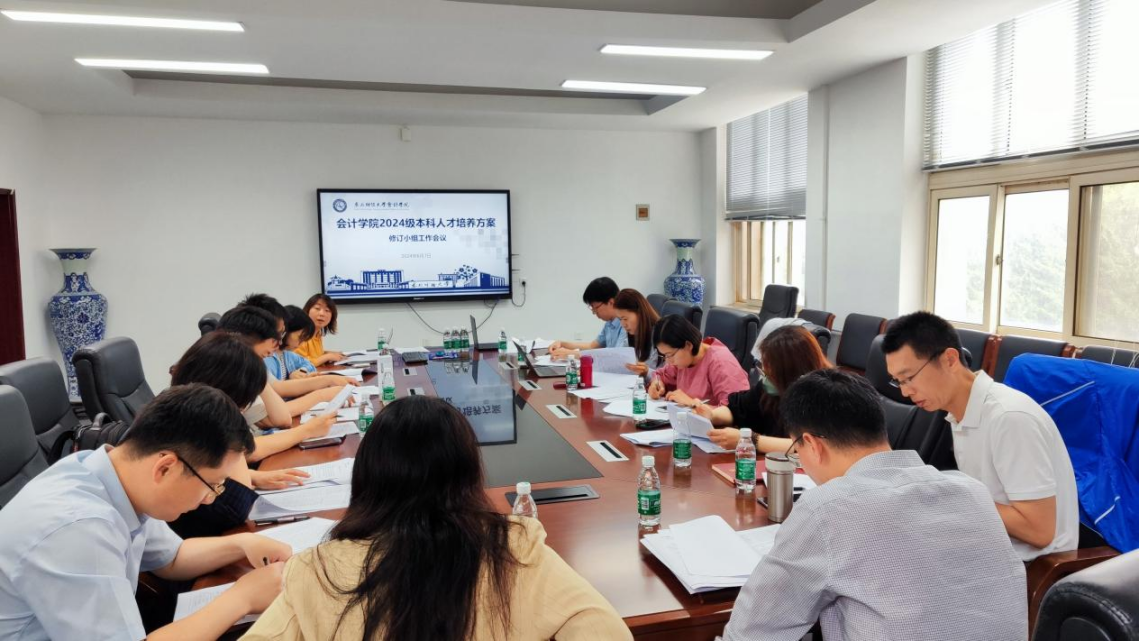
On June 21, the school convened a symposium for the review and discussion of the revision of the undergraduate talent training program for the undergraduate class entering in 2024. The school invited Associate Dean Xueyuan Zhao from the School of Accounting at Central University of Finance and Economics, Associate Dean Xiaorong Li from the School of Public Finance and Taxation at Central University of Finance and Economics, Director Zhiming Ma from the Department of Accounting at Guanghua School of Management, Peking University, Director Hui Fang Yin from the Department of Accounting at Shanghai University of Finance and Economics, Director Xue Wang from the Department of Accounting at Southwestern University of Finance and Economics, and Director Yong Shi from the Department of Auditing at Zhongnan University of Economics and Law of Finance and Economics. During the meeting, Dean Hang Liu of the School of Accounting expressed his gratitude to the participating experts and introduced the overall progress of the school's training program revision. Heads of various departments reported on the specific revisions of the training programs for their respective majors. After deliberation, the experts provided positive evaluations and specific suggestions for the revision of each major's training program. The school carefully recorded the experts' review opinions and fed them back to the respective departments for reference in the subsequent revision process.
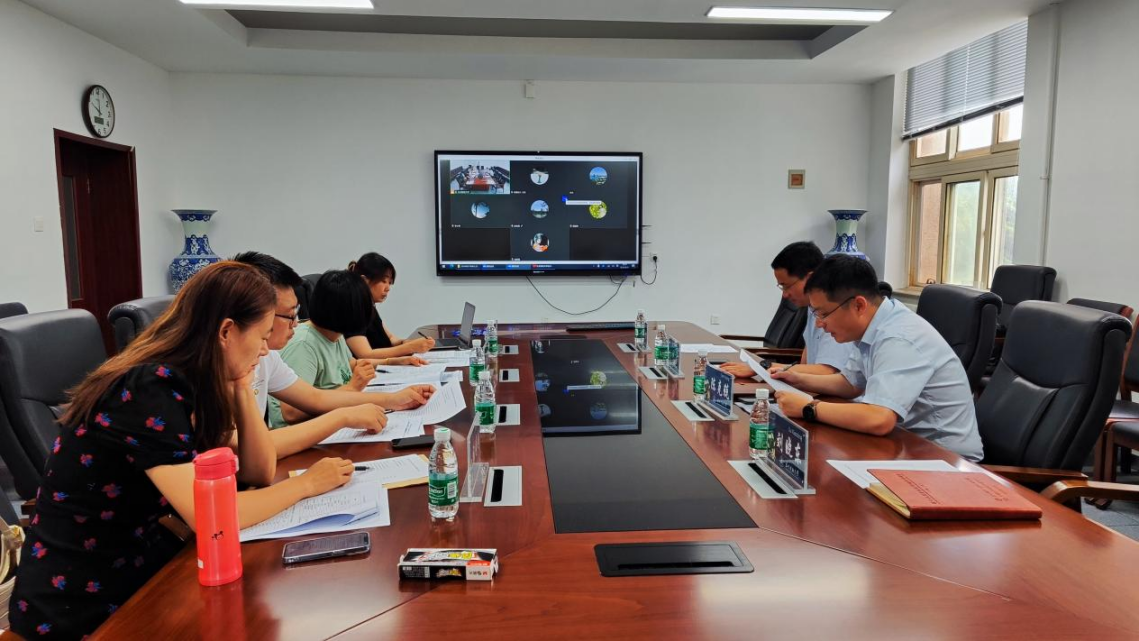
After the review by experts from other universities, the revision of the training program entered the final stage. On June 26, the school held an internal symposium for the review of the revision of the undergraduate talent training program for the undergraduate class entering in 2024. Each department provided a detailed report on the revision process of the training program, discussed and resolved individual and common issues in the new training program one by one, and determined the standards for writing the course transition explanations between the old and new programs and the revision report of the training program.
On July 22, the school held the establishment meeting of the Second Undergraduate Teaching Steering Committee. During the meeting, the members of the Teaching Steering Committee of the School of Accounting reviewed and approved the school's undergraduate talent training program for the undergraduate class entering in 2024. Dongmei Hu, General Manager of Dayang Group Co., Ltd.; Ping Liang, Director of Mainland China Affairs of the Association of International Certified Professional Accountants; Taiping Liu, Managing Partner of the Dalian Branch of Ernst & Young Hua Ming (Special General Partnership) CPA Firm; Yi Li, General Manager of Liaoning Zhonghua Assets Appraisal Co., Ltd.; Ming Zhang, General Manager of Inspur Zhuyuan Education Technology Co., Ltd.; Xinghai Zhang, General Manager of Wafangdian Bearing Group; Hongmei Chen, Chief Representative of China for the International Information Systems Audit Association; Nan Shao, North China Director of ACCA; Changman Yan, Partner and Deputy Director of Rongcheng Certified Public Accountants (Special General Partnership) Liaoning Branch; Qing Zhang, Managing Partner of Northeast Cluster of Deloitte Huayong Certified Public Accountants (Special General Partnership); Zhaoqiang Sui, Assistant President of Yonyou Newdao Technology Co., Ltd.; and Linyue Zhao, General Manager of Shared Finance Department of iFLYTEK Co., Ltd., as external expert committee members, also offered valuable suggestions.
On August 12, Dongbei University of Finance and Economics held the establishment meeting of the Undergraduate Teaching Steering Committee and the first working meeting of the teaching steering committee. During the meeting, the members of the teaching steering committee of Dongbei University of Finance and Economics reviewed and evaluated the undergraduate talent training program for the undergraduate class entering in 2024 across the university. The talent training program for the Accounting major (Certified Public Accountant direction) of our school was rated as a university-level model training program. The model program was released to the entire university as a reference for further improvement of the training programs.
To effectively ensure the quality of the training program revision, the school asked each department to further standardize and refine the training objectives and characteristics in accordance with the model program and the latest requirements, reorganize the course systems of required and elective courses for each major, scientifically set the sequence of professional courses, and reasonably plan the semesters and faculty for cross-departmental elective courses to ensure the scientific, forward-looking, cutting-edge, and leading nature of the talent training system. On August 29, the person in charge of the revision of the training program for each major communicated with the Academic Affairs Office on-site to review and finalize the revised training program.
Thus, the undergraduate talent training program for the undergraduate class entering in 2024 at the School of Accounting, after going through important stages such as initiation, study and discussion, solicitation of opinions, drafting of revisions, faculty-student symposiums, research and exchange, internal and external reviews, revision and confirmation, submission for review, and finalization and implementation, which lasted for four months, was successfully completed.
The undergraduate talent training program is the core content of undergraduate education, and the quality of the training program determines the quality of undergraduate talent cultivation. This revision of the training program widely listened to the opinions of faculty, students, and industry experts, and organized internal and external reviews. The revision process was scientific and rigorous. The new training program is oriented towards industry development needs, implements the reform goals of undergraduate talent training models that integrate science and education, industry and education, and entrepreneurship and innovation empowered by digital intelligence, promotes cross-disciplinary integration, and plays an important supporting and leading role in comprehensively improving the quality of talent cultivation at the School of Accounting.







